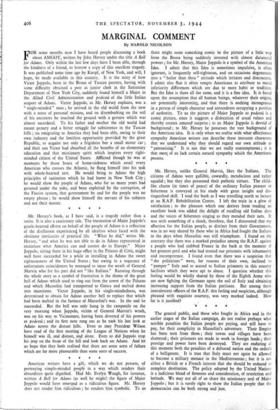American writers have a gift, which we do not possess,
of portraying simple-minded people in a way which renders their absurdities quite dignified. Had Mr. Evelyn Waugh, for instance, written A Bell for Adano (as well he might) the figure of Major Joppolo would have emerged as a ridiculous figure. Mr. Hersey does not render him ridiculous ; he renders him symbolic. To us
there might seem something comic in the picture of a little wop from the Bronx being suddenly invested with almost dictatorial powers ; for Mr. Hersey, Major Joppolo is a symbol of the American Idea. I admit that this Idea is sometimes impulsive, is often ignorant, is frequently self-righteous, and on occasions degenerates into a " holier than thou" attitude which irritates and disconcerts. I admit also that it often tempts Americans to attribute to moral inferiority differences which are due to mere habit or tradition. But the Idea is there all the same, and it is a fine idea. It is based upon the assumption that all human beings, whatever their origins, are potentially interesting, and that there is nothing incongruous in a person of simple character and antecedents occupying a position of authority. To us the picture of Major Joppolo as podesta is a comic picture, since it suggests, a dislocation of usual values and thereby creates amused surprise ; to us Major Joppolo is devoid of background ; to Mr. Hersey he possesses the vast background of the American idea. It is only when we realise with what affectionate sympathy American writers can describe these innocent characters that we understand why they should regard our own attitude as " patronising." It is not that we are really contemptuous ; it is that most, of us lack certain natural sympathy which the Americans possess.
* * *


























 Previous page
Previous page